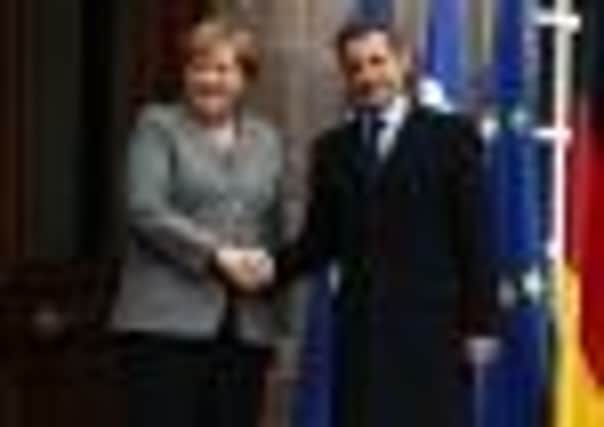Markets rally on plan for eurozone ‘fiscal union’


The rally came after Mrs Merkel said Europe was working towards setting up a “fiscal union”, in an attempt to resolve the single currency’s debt crisis.
She told the Bundestag that a new EU treaty was needed to set up such a union and impose budget discipline before she meets the French president Nicolas Sarkozy – who has also called for EU treaty changes – on Monday.
Advertisement
Hide AdAdvertisement
Hide AdIn her speech, Mrs Merkel promised “concrete steps towards a fiscal union” – in effect close integration of the tax-and-spend policies of individual eurozone countries, with Brussels imposing penalties on members that break the rules.
“We need budget discipline and an effective crisis management mechanism,” she said. “So we need to change the treaties or create new treaties.”
The German government has been pressing for changes to establish powers to veto national budgets in the eurozone that breach agreed rules. “We have started a new phase in European integration,” Mrs Merkel said.
It has been feared that greater fiscal union within the eurozone would disadvantage Britain by creating a two-tier Europe.
But yesterday Prime Minister David Cameron denied that Britain was being sidelined as he argued that “a big bazooka approach” was needed to convince the markets that the eurozone institutions have the firepower to put a halt to speculation over the single currency.
Speaking after talks with Mr Sarkozy in Paris, Mr Cameron said institutions such as the European Central Bank should use “everything they have got” to defend the single currency and resolve the current crisis.
The Prime Minister also called for “fundamental” reform to address the lack of competitiveness of some EU economies.
Mr Cameron said he does not believe that changes to the European Union treaty are needed, a position that could pit him against Germany and France next week when they are expected to push for tougher rules against government overspending to be written into the EU treaty.
Advertisement
Hide AdAdvertisement
Hide AdInstead, Mr Cameron said the eurozone needs to convince markets that it is doing all it can to dig itself out of the crisis and make changes to improve its competitiveness.
“Neither of those things actually require treaty change, but I’m very clear: if there is treaty change, then I will make sure that we further protect and enhance Britain’s interests.”
Mr Cameron maintained that Britain would have some influence over the outcome of next week’s talks.
He said: “We are one of Europe’s major economies, we are a big player in the single market.
“We want growth on the European continent to help the British economy.
“We want to drive change in the single market to get that and we want to help resolve the crisis in the eurozone.
“In the end, what that is about is convincing the markets that the institutions of the euro will defend and protect and promote that currency with everything they have got – the so-called big bazooka approach that I have spoken about.
“But it also means fundamentally grappling with the lack of competitiveness of some European economies and getting to grips with that agenda to make sure that the eurozone can function properly.”
Advertisement
Hide AdAdvertisement
Hide AdYesterday’s British-French meeting was supposed to be a full-blown summit, but it was downgraded to a brief meeting over lunch to prepare the ground for next week.
Chancellor George Osborne backed up the Prime Minister’s position. He said: “We need the eurozone to resolve their crisis.
“Britain doesn’t want to be a part of that integration – we’ve got our own national interests – but it is in our economic interest that they do sort themselves out.
“The biggest boost that could happen to the British economy this autumn would be a resolution of the euro crisis.”
The prospect of some action to restore market confidence was greeted warmly in the markets, despite Mrs Merkel’s warning that it would take years, rather than months, to sort out the debt crisis.
Investors are hopeful that if eurozone governments agree to longer-term changes in the way they control their finances, then the European Central Bank will agree to step up its interventions in the bond markets.
Those interventions keep borrowing rates down for debt-troubled nations like Italy.
Yesterday European stocks rose, as did bonds for Italy and Spain. Britain’s FTSE 100 gained 1.1 per cent to 5,548.87 while Germany’s DAX added 1 per cent to 6,094.66. France’s CAC-40 climbed 1.4 per cent to 3,172.22.
Advertisement
Hide AdAdvertisement
Hide AdItaly’s ten-year bond yield was down to 6.52 per cent, almost a full percentage point lower than Wednesday, an indication that investors have high hopes of next week’s talks to save the euro. Spain’s ten-year yield was down to 5.56 per cent.
Wall Street also rose – the Dow Jones industrial average was up 0.8 per cent at 12,111 in early trade while the Standard & Poor’s 500 index rose 0.8 per cent to 1,255 after the release of cautiously upbeat US jobs data.
European Council president Herman van Rompuy will present a paper setting out options for the way forward to EU leaders next week.